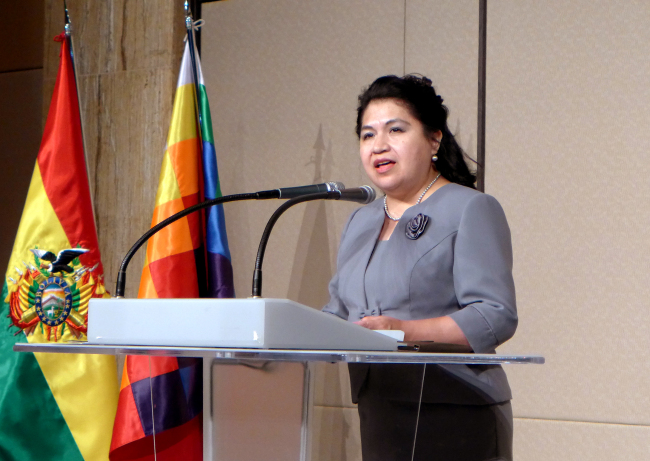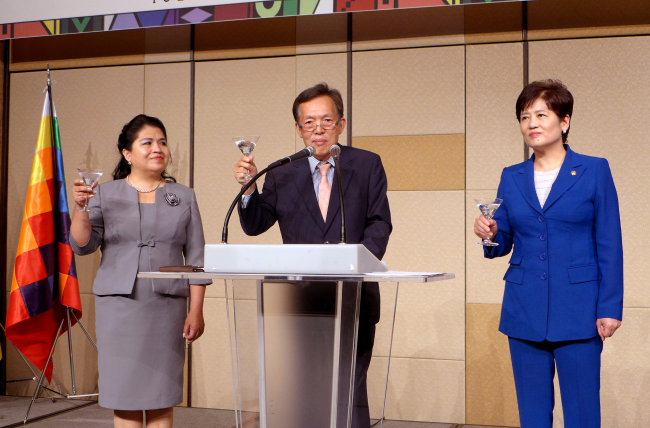The Bolivian embassy commemorated the 191th anniversary of national independence last week, also highlighting opportunities in the course of a decade-long social and economic progress.
The event on Aug. 6, 1825 liberated the Latin American nation from the grip of colonial Spain that had started in the 16th century. Through unrelenting guerilla resistance by revolutionaries since 1809 -- chiefly Venezuelan general and politician Simon Bolivar, whose name gave birth to “Bolivia,” and Venezuelan freedom fighter and second Bolivian President Antonio Jose de Sucre -- the country gained sovereignty alongside Venezuela, Colombia, Ecuador, Peru and Panama.
The National Day reception in Seoul on Friday was the third of its kind since the embassy reopened in 2013. Following Korea’s statewide predicament from the 1997 Asian financial crisis, both governments closed their embassies in the late 1990s. The two countries established diplomatic relations in 1965.
 |
Bolivian Ambassador Guadalupe Palomeque de Taboada (Joel Lee / The Korea Herald) |
“A country’s development is possible only when people support the government that embodies people’s politics,” Bolivian Ambassador Guadalupe Palomeque de Taboada said in a speech. “Under the leadership of President Evo Morales, who was elected twice, Bolivia recorded 4.8 percent growth last year, the highest rate in South America for two straight years.”
Morales, born in 1959, is Bolivia’s first president from an indigenous background. His administration has implemented “leftist” policies aimed at combating poverty, racism and sexism; curbing the influences of the U.S. and profiteering conglomerates; and promoting education and literacy, indigenous rights and environmental protection.
A vocal critic of neoliberalism, he has advocated and administered “Evonomics” economic policy, which observers say buttressed the country’s transformation in recent years.
“Our government is laying the foundation for foreign direct investment through friendly laws, incentives and policies since 2014,” the diplomat stressed. “We have also succeeded in slashing extreme poverty from 38 to 17 percent of our population. Promoting a multicultural society and productive economic policies, we have actively redistributed wealth and reduced discrimination.”
Bolivia’s main industries are agriculture, forestry, fishing, refined petroleum and manufacturing of textiles, clothing and refined metals. The country has a wealth of minerals, particularly tin.
 |
(From left) Bolivian Ambassador Guadalupe Palomeque de Taboada, Korea International Cooperation Agency Vice President Kwon Tae-myon and Korean Minister of Gender Equality and Family Kang Eun-hee (Joel Lee / The Korea Herald) |
Emphasizing private sector investment that multiplied eightfold since 2005, the envoy said state expenditure in manufacturing and infrastructure surged to over 30 percent of the national budget. Half of corporate investment is channeled into the energy sector, she stressed, pointing to ongoing construction of “Gran Chaco Carlos Villegas Quiroga” liquefied petroleum gas refinery and liquefied natural gas plant. Samsung Engineering is in its final stage of constructing a petrochemical fertilizer plant in the Cochabamba province, she added.
“Bolivia, located in the heart of South America, prioritizes linking its vast territory. It is modernizing various infrastructures -- roads, bridges, railroads, airports and hydroelectric power plants,” Palomeque de Taboada said.
“These industrialization schemes are part of our state and food security measures, and include photovoltaic module installation and irrigation facility expansion. Bolivia is striving to tread a path of sustainable development in harmony with our mother earth.”
Hyundai Development is nearing the construction of the Banegas Bridge spanning 1.54 kilometer, the country’s longest, in the eastern part. Several Korean firms will participate in “smart city” construction projects in the city of Santa Cruz in the eastern country, in addition to building solid and liquid waste processing plants.
Acknowledging the Korea International Cooperation Agency, she said the government institution offering official development assistance has provided ample support to public health, agriculture, transportation and energy sectors, which are guided by the national development plan.
By Joel Lee (
joel@heraldcorp.com)









![[Today’s K-pop] Blackpink’s Jennie, Lisa invited to Coachella as solo acts](http://res.heraldm.com/phpwas/restmb_idxmake.php?idx=644&simg=/content/image/2024/11/21/20241121050099_0.jpg)